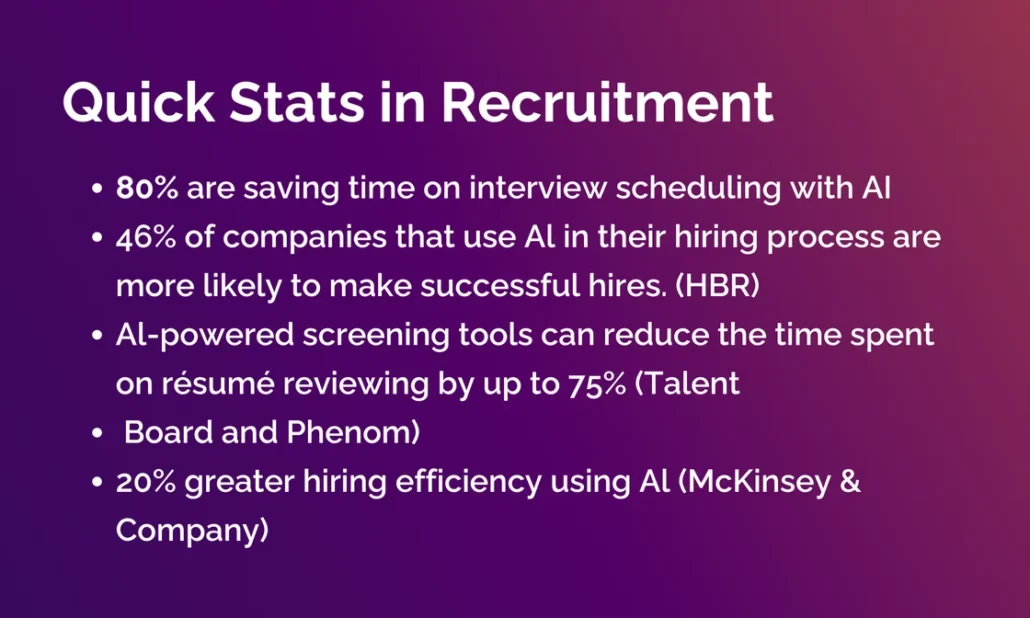As we navigate the ever-evolving landscape of talent acquisition, it’s crucial to understand how artificial intelligence (AI) is transforming how we identify and engage with top talent. With more than 80% of organizations utilizing AI-powered software in their talent acquisition processes, with 60% reporting positive results, paying attention to implementing AI into your firm is crucial for long-term success. We also know that, with most things, there are implications to consider when decision-making for our organizations.
kpCompanies have stayed on top of the trends that will change recruitment as we know it- and want to share key use cases and “things to watch out for” with these AI advancements.
Automating Screening and Assessment
AI Candidate Screening and Assessment technologies have been around for over a decade. Its evolution continues to develop as the technology has moved from simple keyword-based filtering a decade ago to complex, multi-faceted tools that play a critical role in talent acquisition strategies today. The benefits in terms of efficiency, consistency, and cost savings in the screening and assessment process are significant. By carefully leveraging AI, we can reduce the time and effort required for manual screening, allowing us to focus on deeper candidate evaluation and engagement.
Implications:While AI offers significant benefits in terms of efficiency, consistency, and cost savings in the screening and assessment process, it also poses challenges related to bias, data privacy, and the potential loss of human elements in decision-making. Balancing these pros and cons requires careful implementation, continuous monitoring, and a commitment to ethical practices in AI deployment.
Additionally, just as AI is getting smarter, so are humans, some candidates may curate their resumes to pass ATS systems, which may not reflect their true skills. Ensuring a robust screening process is crucial as we navigate this while also keeping inclusivity in mind when hiring. We must design our screening processes to verify the authenticity of candidates’ skills and experiences. This might include integrating practical assessments and structured interviews to ensure we identify the best fit for our roles.
Predictive Analytics for Candidate Fit
AI’s ability to analyze historical data, job descriptions, and candidate profiles allows it to predict a candidate’s likelihood of success in a specific role. This predictive power improves our hiring accuracy and reduces the risk of costly mis-hires (CJPI).
Implications: Relying on predictive analytics means continuously updating our data and algorithms to reflect the latest trends and requirements. We must also be aware of the biases in the hiring process and, therefore, now in AI, not to weed people out based on certain backgrounds and skill sets.
Personalized Communication and Engagement
AI-powered chatbots and virtual assistants have revolutionized candidate engagement by providing tailored information, answering questions, and scheduling interviews. This personalized approach enhances the candidate experience and builds positive relationships from the outset (CJPI).
Implications: While AI can handle routine interactions, it’s important to integrate personal touchpoints to address complex queries and foster a sense of connection. Regular audits of our AI communication tools will help us ensure they function optimally and ethically.

Skills-Based Hiring
The shift towards skills-based hiring, supported by AI, focuses on a candidate’s potential and transferable skills rather than traditional job titles. This approach widens our talent pool and allows us to tap into a diverse range of candidates who might otherwise be overlooked (hirevue.com) (CJPI).
Implications: Implementing skills-based hiring requires us to redesign our job descriptions and assessments to focus on relevant skills and competencies. Continuous training for our hiring teams on the latest AI tools and skills assessment methods will be essential.
Enhancing Diversity and Inclusion
AI can help eliminate unconscious biases in the hiring process by evaluating candidates solely on their skills and qualifications. This is thought to foster a more diverse and inclusive talent pool, crucial for innovation and adaptability (Compunnel)
Implications: While AI can aid in promoting diversity, it’s vital to continuously monitor and update our AI systems to ensure they don’t inadvertently perpetuate existing biases. Regular training on unconscious bias for our teams will complement our AI efforts in creating a truly inclusive hiring process.
Regulatory Considerations
The rise of AI in HR has attracted regulatory scrutiny, emphasizing the need for ethical and responsible AI use. Ensuring compliance with privacy and data security standards is paramount as we integrate AI into our recruitment processes (Talencio).
Implications: Staying abreast of regulatory changes and ensuring our AI tools meet the highest standards of security and fairness will be critical. This involves holding our AI vendors accountable and providing ongoing training to our teams on ethical AI use.
In conclusion, AI offers exciting possibilities for enhancing our talent acquisition strategies. However, it demands vigilant and responsible implementation to fully realize its benefits without compromising our values or ethical standards. How are you and your team using AI in the recruitment process?
kpCompanies is staying at the forefront of these changes with the inclusive lens we’ve had for over 20 years. Contact us if you need an executive search and inclusive sourcing partner.